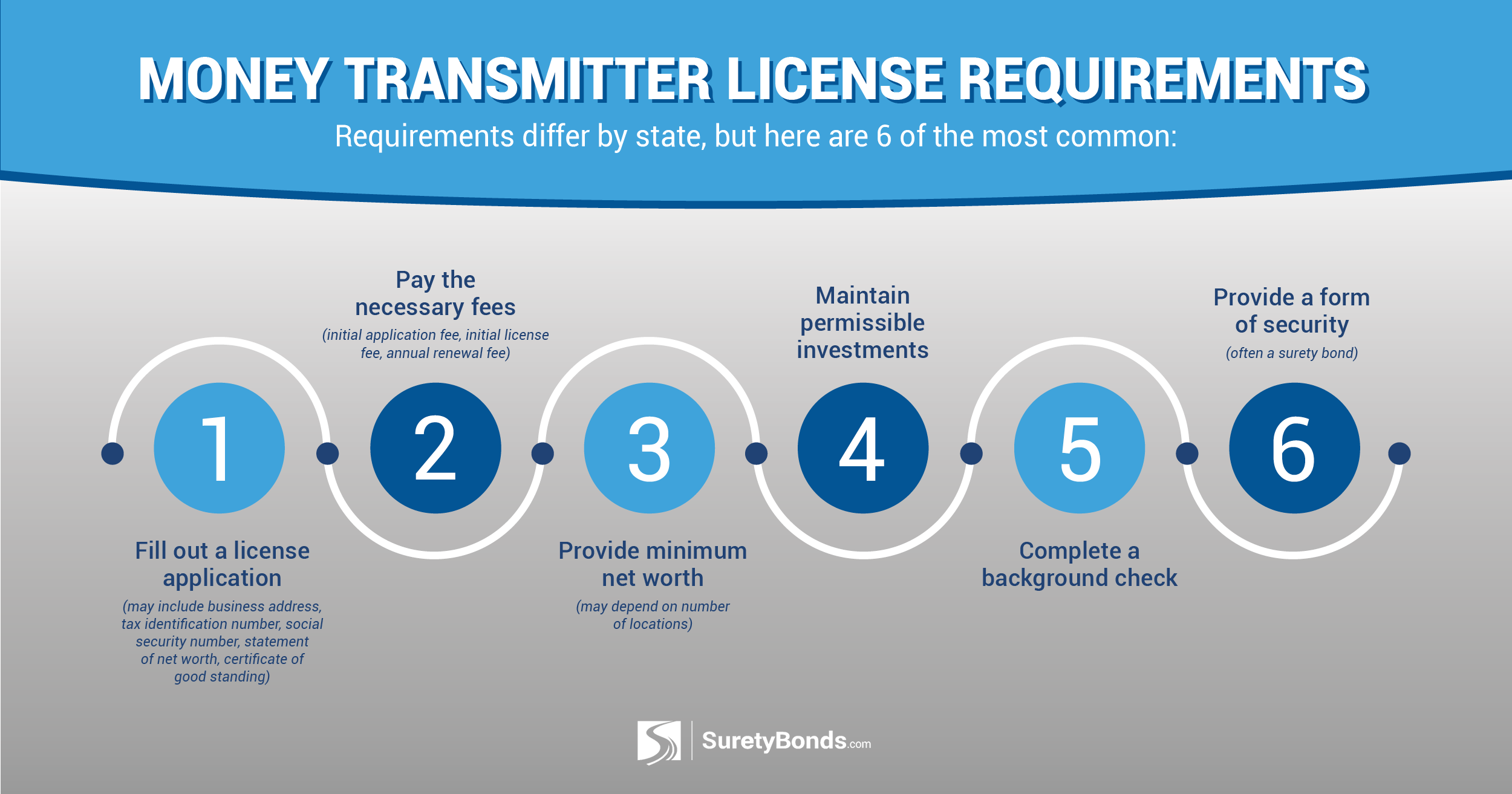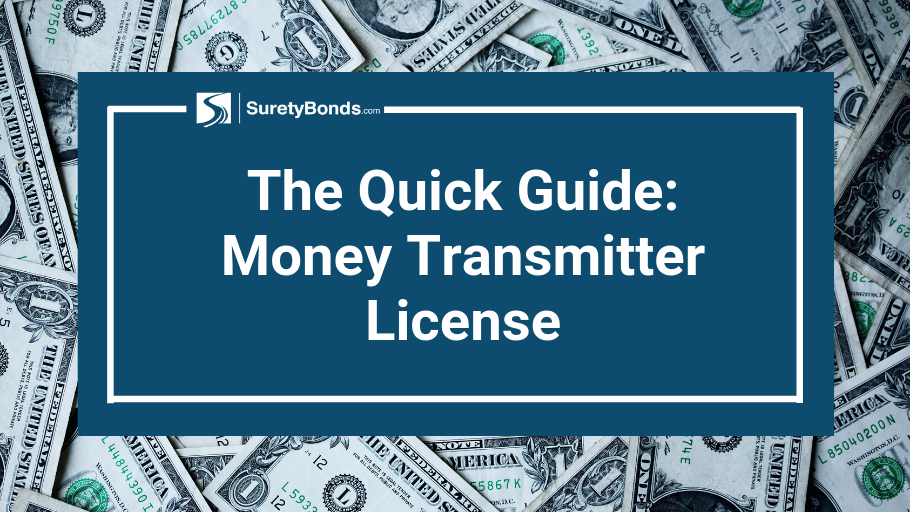SuretyBonds.com has developed this general licensing guide as an introduction to money transmitter licensing across the country. Follow this Money Transmitter License Guide to understand common registration requirements for individuals licensed as professional money transmitters.
The money service business industry has undergone rapid change and transformation as technology has evolved over the past decade. The emergence of digital currencies (also called cryptocurrency) has necessitated the formation of laws addressing this alternative form of payment. The prevalence of money laundering has required stricter state legislation and regulation of money service businesses throughout the country. Specifically, the money transmitter industry is having to adjust on the fly to these new regulations. Currently, 49 of the 50 states require money transmitters to file a surety bond. Montana is the only state that has not created a surety bond requirement for money transmitters. We at SuretyBonds.com have created this a quick guide to outline the current state of the money transmitter industry and detail some of its licensing requirements.
What is a money transmitter?
Also referred to as money remitters or money transfer services, money transmitters transfer funds or provide payment services. Most states define anyone who receives money to transmit money to another location by any means, including wire, facsimile, electronic transfer or payment instrument, as a money transmitter. Money transmitters are one of several disciplines within money services businesses (MSB), which describes businesses that convert or wire money. Although the majority of money services business disciplines require a minimum threshold to be considered an MSB, a threshold does not exist for money transmitters. Therefore, any business that transfers funds or provides payment services is considered a money transmitter regardless of business activity. Some examples of money transmitters include Barclays, PayPal, Western Union and MoneyCorp.
Learn more about Money Transmitter License Bonds here.
What are the licensing requirements?
Because every state has its own licensing requirements, there is considerable variability in money transmitter requirements from state to state. However, every state besides Montana requires transmitters to satisfy requirements to be licensed as a money transmitter. It is important for money transmitters to be familiar with the licensing requirements in every state in which they do business. Despite the variability, common requirements for money transmitters include the following:
- License application (which may include business address, tax identification number, social security number, statement of net worth, certificate of good standing, etc.)
- Payment of fees (initial application fee, initial license fee, annual license renewal fee)
- Minimum net worth (could depend on number of locations)
- Maintenance of permissible investments
- Background check
- Form of security (usually a surety bond)
Most bond requirements have a minimum and maximum amount specified in the state’s legislation. For each location within the state, there is often a smaller additional amount. The commissioner or superintendent of the state’s department of financial institutions will likely determine the amount of the applicant’s bond based on a number of factors:
- Applicant’s financial condition
- Applicant’s net worth
- Amount of business for the previous year
- Anticipated business for the upcoming year
In addition to the various state requirements, money transmitters must also register with the Financial Crimes Enforcement Network (FinCEN) of the U.S. Department of Treasury. Registration is valid for two years before it must be renewed. Money transmitters must use the BSA E-Filing System to submit initial registration forms and renewals. As of July 1, 2012, FinCEN no longer accepts paper forms. There are civil and criminal penalties for money services businesses that do not register with FinCEN.
You can find instructions for how to enroll and submit your registration form in the BSA E-Filing System here. Section 1022.380, Title 31 of the Electronic Code of Federal Regulations details the registration requirements for money services businesses with FinCEN.
If you are curious about a specific state’s licensing requirements, a comprehensive list of all state requirements pertaining to money transmitters can be found here.
For a visualization of the licensing process, see the graphic below.

What dilemmas are the money transmitter industry facing?
As mentioned above, 49 of the 50 states require money transmitters to secure a surety bond before they can receive approved licenses. These state requirements are layered on top of federal registration requirements with FinCEN. In addition, money transmitters must be licensed in every state in which money transmission activity takes place. For example, if a money transmitter has a principal location in California but conducts money transmission business in 37 other states, the transmitter must be bonded in all 37 states in addition to California. As a result, licensing for money transmitters in the U.S. can be very expensive.
Recent research estimated the initial licensing cost for money transmitters for all 53 states and territories to be just over $175,000, with renewal costs of slightly more than $135,000. High costs and varying requirements by state is widely considered by individuals working in the industry to be an inefficient system of regulations. It remains to be seen if FinCEN creates a uniform set of licensing requirements for money transmitters to diffuse confusion, potentially lower costs and streamline the licensing process.
Another issue facing the money transmitter industry revolves around who qualifies as a money transmitter and therefore must register and meet licensing requirements. With emerging technology constantly creating new classifications of businesses, the MSB industry must adjust its standards on a regular basis. In 2014, FinCEN ruled that bitcoin exchanges and payment processors are money transmitters under U.S. law. Bitcoin exchanges involve matching buyers and sellers, while processors facilitate purchases between consumers and merchants. This ruling is worrying to some, as there may be few limits to the scope of the MSB (specifically money transmitter) definition. As technologies continue to evolve and the scope of the MSB industry is tested, it will be interesting to see what businesses are lumped into the MSB category and must comply with the heavy licensing and registration requirements.
For more information, check out our Money Transmitter License Surety Bond Guide.
Founded in 2009, SuretyBonds.com has streamlined the direct-to-consumer bonding experience by providing efficient, innovative, and informed surety bond solutions nationwide. SuretyBonds.com encourages its clients, employees, and industry colleagues to Grow Through Education every day.
